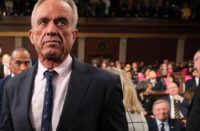The age of political leaders is increasingly becoming a topic of concern among American voters. Recent instances of the Senate Majority Leader, Mitch McConnell, freezing in front of cameras have prompted discussions about the advanced age of politicians. This concern is further heightened by the fact that the recent presidential candidates, Donald Trump and Joe Biden, were the oldest to take office, and if re-elected, will surpass the record held by Ronald Reagan, who left office at 77.
The aging trend is not just limited to the presidency. The current Congress boasts the oldest median age in history, with 65 in the Senate and 58 in the House. This has led to calls for competency tests for candidates above 75 and a demand for a younger generation of leaders.
Concerns about the age of politicians are not unfounded. According to an AP-NORC poll, 77% of American adults feel that Biden is too old to serve another term effectively, while 60% hold similar views about McConnell. However, the question remains whether voters will start rejecting candidates based on their age.
It’s important to note that the structure of the American political system makes it difficult to oust older politicians, even amidst growing concerns about their ability to lead. Hence, voters might continue to back older politicians despite expressing a preference for younger leaders.
Concerns about a president’s age are not new. During Reagan’s tenure, there was an increasing worry about his ability to serve due to his age. In today’s era, presidents usually disclose their health details, and the public demands transparency due to the physically and mentally demanding nature of the job. However, age is not a perfect indicator of health, and some older politicians are seen as more capable than others.
Despite these concerns, some citizens believe there should be clearer rules regarding the maximum age for serving politicians. Polls reveal strong support for age limits for Senate service and mental competency tests for candidates over 75. The ideal age for a president, according to half of the Americans surveyed by the Pew Research Center, is someone in their 50s.
However, the age of politicians also influences the issues they prioritize, which might not align with the concerns of younger voters. Therefore, younger Americans want to see themselves represented in government, which is currently not the case. Despite the expressed preference for younger leaders, the political system may continue to favor older politicians due to factors such as voter demographics, incumbency bias, and the increasing cost of running for office.
As Americans live longer, we might see older leaders remain in power, unless they choose to step aside for the younger generation. This article emphasizes the need for self-awareness among older leaders about when it’s time to allow younger leaders to step up.





